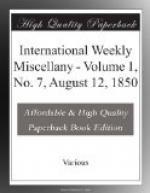* * * * *
[FROM FRASER’S MAGAZINE.]
ENGLISH HEXAMETERS.
BY WALTER SAVAGE LANDOR.
Askest thou if in my youth I have mounted,
as others have mounted,
Galloping Hexameter, Pentameter cantering
after,
English by dam and by sire; bit, bridle,
and saddlery, English;
English the girths and the shoes; all
English from snaffle to crupper;
Everything English around, excepting the
tune of the jockey?
Latin and Greek, it is true, I have often
attach’d to my phaeton
Early in life, and sometimes have I ordered
them out in its evening,
Dusting the linings, and pleas’d
to have found them unworn and untarnisht.
Idle! but Idleness looks never better
than close upon sunset.
Seldom my goosequill, of goose from Germany,
fatted in England,
(Frolicksome though I have been) have
I tried on Hexameter, knowing
Latin and Greek are alone its languages.
We have a measure
Fashion’d by Milton’s own
hand, a fuller, a deeper, a louder.
Germans may flounder at will over consonant,
vowel, and liquid,
Liquid and vowel but one to a dozen of
consonants, ending
Each with a verb at the tail, tail heavy
as African ram’s tail,
Spenser and Shakspeare had each his own
harmony; each an enchanter
Wanting no aid from without. Chevy
Chase had delighted their fathers,
Though of a different strain from the
song on the Wrath of Achilles.
Southey was fain to pour forth his exuberant
stream over regions
Near and remote: his command was
absolute; every subject,
Little or great, he controll’d;
in language, variety, fancy,
Richer than all his compeers and wanton
but once in dominion;
’Twas when he left the full well
that for ages had run by his homestead,
Pushing the brambles aside which encumber’d
another up higher,
Letting his bucket go down, and hearing
it bump in descending,
Grating against the loose stones ’til
it came but half-full from the bottom.
Others abstain’d from the task.
Scott wander’d at large over Scotland;
Reckless of Roman and Greek, he chanted
the Lay of the Minstrel
Better than ever before any minstrel in
chamber had chanted.
Never on mountain or wild hath echo so
cheerfully sounded,
Never did monarch bestow such glorious
meeds upon knighthood,




